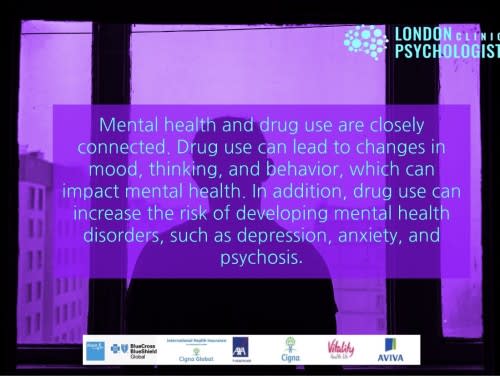Drug Use and Declining Mental Health

posted 25th April 2023
Drug Use and Mental Health
People take drugs for a variety of reasons. These can include self-medication, to escape reality, or to cope with stress, anxiety, or depression. The long-term effects of drug use can vary depending on the type of drug, but generally, they can include physical health problems, mental health issues, and addiction. Long-term drug use can also lead to financial, social, and legal problems. In addition, long-term use of these drugs can increase the risk of developing mental health disorders.
Drug use can lead to declining mental health in a number of ways. Drugs can interfere with the brain’s ability to function normally, leading to changes in mood, thinking, and behavior. These changes can include feelings of depression, anxiety, paranoia, and irritability. In addition, long-term drug use can lead to addiction, which can further impact mental health by making it difficult to control impulses, regulate emotions, and maintain healthy relationships. People with mental health issues may take drugs for a variety of reasons. These include self-medication, to escape reality, or to cope with stress, anxiety, or depression. Other illegal drugs that people take include heroin, methamphetamine, ecstasy, and LSD, among others. The effects of these drugs on mental health can vary depending on the individual, but generally, they can lead to increased anxiety, paranoia, and depression. In addition, long-term use of these drugs can increase the risk of developing mental health disorders.
Research has shown that men are more likely to take drugs than women. One of the main reasons for this is the fact that men are more likely than women to engage in risky behavior, such as drug use. Other factors that may contribute to this include biological, psychological, and social factors. For example, men may have higher levels of certain hormones that may be associated with drug use, or they may have a higher tolerance for risk-taking. In addition, certain social norms may lead men to be more likely to take drugs.
Cocaine use can have various mental health effects, from mild to severe and long-term. Some of the most common mental health effects of cocaine use include increased anxiety, paranoia, decreased impulse control, depression, irritability, agitation, and mood swings. Cocaine can also lead to psychotic symptoms, such as hallucinations and delusions. In addition, long-term cocaine use can increase the risk of developing depression, anxiety, and other mental health disorders.
Cocaine and other illegal drugs can increase the risk of developing a range of mental health disorders, including depression, anxiety, bipolar disorder, psychosis, and substance use disorder. Long-term use of these drugs can also increase the risk of developing other mental health conditions, such as post-traumatic stress disorder (PTSD) and schizophrenia.
According the Royal College of Psychiatry, cannabis usage can trigger mental health problems in people who, prior to taking it, had reported no problems with their mental health. Unfortunately, this is my experience of seeing cannabis users coming into my clinic too. Many will have taken up cannabis as a recreational drug, whilst many, started using it for enjoyment, however have subsequently become reliant on it for self-medication.
Research has shown that if you are predisposed to mental illness, such as schizophrenia, then using cannabis will put you at greater risk of developing the illness. More regular use can lead to an increase in this risk. Younger people are more at risk as their developing brains can be more vulnerable to the active chemicals in cannabis. Sometimes, people find that cannabis can make them feel better for a while after taking it, however, these effects are usually short-lived and can make symptoms of depression and anxiety worse over the long term. It can also delay you getting the treatment you already badly need and therefore the underlying problems causing the depression/anxiety in the first place, remain unresolved.
If you feel you may have a problem with cannabis use, you should seek help as soon as possible. Speak to your GP or psychologist about the problem. A psychologist in particular, will help you find more productive ways of dealing with what is causing your depression or anxiety by helping you identify what thoughts, emotions and behaviours contribute to the depression and finding a way to address these in therapy. Deal with it now, rather than letting the problems go unresolved. Mental health usually gets better when it is addressed with the aid of professional help. Don't ignore it and don't rely on it resolving itself, it most probably won't!
If any of the issues above have affected you and you feel you would benefit from some professional help, please get in contact: info@londonpsychologistclinic.co.uk



